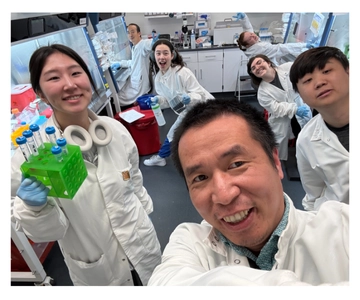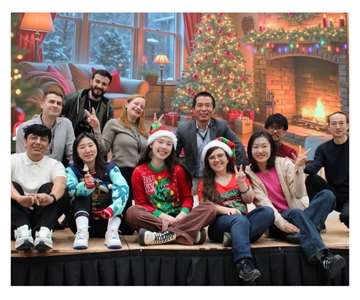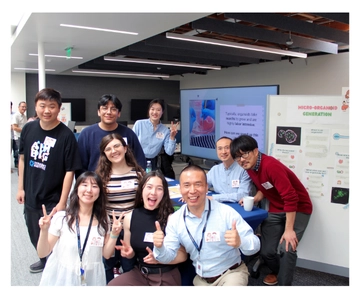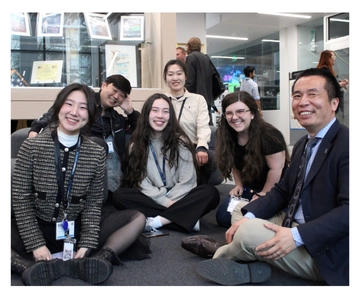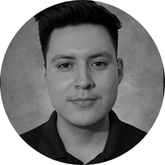DR. ZHAOHUI WANG'S LABORATORY
ABOUT DR. ZHAOHUI WANG
Dr. Zhaohui Wang is an Assistant Professor and the Director of Precision Medicine at the Terasaki Institute. He also serves as an adjunct assistant professor at Duke University. Dr. Wang earned his Ph.D. in Biochemistry and Molecular Biology from the Beijing Institute of Genomics, Chinese Academy of Sciences, where he discovered Matrine, a novel autophagy inhibitor with potential synergistic effects for cancer treatment.
Following his Ph.D., Dr. Wang completed his postdoctoral training at the Duke Brain Tumor Center. There, he characterized TERT promoter mutations in a large cohort of cancer patients, confirming the positive correlation between TERT promoter hotspot mutations and telomerase activation in adult gliomas. His research also uncovered the gain-of-function of PPM1D mutations in brainstem gliomas, leading to the identification of a promising combination therapy with PARP inhibitors for PPM1D-mutant brainstem gliomas. This type of brain tumor predominantly affects children and previously had no effective treatment options available.
After his postdoctoral training, Dr. Wang took on the role of Executive Director at the Duke Woo Center for Big Data and Precision Health. Driven by the challenges of developing preclinical animal models for pediatric brain tumors and IDH-mutant gliomas, he shifted his focus to developing next-generation organoid models to overcome the limitations of traditional animal models and conventional organoid culture. At the center, he led a multidisciplinary team to invent Micro-OrganoSphere (MOS) technology, a rapid and high-throughput organoid culture approach that enhances precision oncology and various applications using normal tissue-derived organoids. Additionally, he spearheaded efforts to leverage machine learning and big data, adopting a multidisciplinary approach to bridge the gap between AI, imaging science, healthcare data, and clinical domain knowledge. This initiative supported research projects, educational experiences, and entrepreneurship opportunities for Duke faculty and students in collaboration with clinical and industry partners worldwide.
Dr. Wang was subsequently invited to join a spin-off company that licensed the MOS technology. There, he spearheaded early research efforts, diagnostic assay development, and partnerships with top academic institutions, pharmaceutical, and biotech companies.
Equipped with extensive experience from both academia and industry, Dr. Wang is committed to finding more effective and less toxic cancer treatments. His lab at TIBI focuses on precision medicine, brain tumors, stem cells, tissue regeneration, and the development of next-generation organoid technology. His dedication to advancing biomedical innovation makes his lab an exciting and dynamic environment for researchers passionate about transforming patient care.
SPEAKING HIGHLIGHTS


RESEARCH OVERVIEW
Dr. Wang's laboratory is dedicated to advancing organoid technology and disease modeling to enhance our understanding of stem cell biology and develop novel cancer treatments, particularly for gliomas. Our research integrates innovative ex vivo models, AI-enhanced phenotypic screening, biomaterials, and biosensors to address three main objectives in precision medicine:
Next-Generation Patient Avatars for Precision Oncology and Drug Discovery
By leveraging our advanced organoid and organ-on-a-chip technologies, we aim to revolutionize personalized medicine through the creation of physiologically relevant, patient-specific avatars. These avatars are crucial for understanding the biology of cancer and serve as the cornerstone for developing novel treatments and advancing personalized medicine.
Brain Tumor Research
Our lab aims to overcome the challenges of brain tumor research by establishing physiologically relevant ex vivo brain tumor models, particularly for cases where preclinical animal models are difficult to develop, such as pediatric brain tumors and certain low-grade adult gliomas. These models will accurately replicate the tumor microenvironment and blood-brain barrier, thereby accelerating translational research and guiding treatment for glioma patients. We are especially interested in exploring cancer-neuron crosstalk in gliomagenesis. By developing a multi-organ-on-a-chip culture system integrated with biosensors and neural circuits, we aim to understand the intricate interactions between glioma cells and their surrounding neural ecosystem, uncover novel therapeutic targets, and improve treatment strategies. Ultimately, we will leverage our high-throughput AI-enhanced phenotypic screening platform to identify effective treatments for brain tumors.
Cellular Plasticity During Tissue Regeneration and Repair
Cellular plasticity is crucial for tissue homeostasis and repair, allowing differentiated cells to revert to a progenitor-like state or transdifferentiate into other cell types. This ability is vital for maintaining tissue integrity and function, especially following injury. Despite its importance, it remains unclear whether cell fate plasticity is an inherent property of predetermined subpopulations, or a stochastic process influenced by environmental cues. Understanding these principles could provide critical insights into fundamental biological processes. We will leverage both iPSC and adult stem cell organoid models and employ a multidisciplinary approach using recently developed techniques to understand the spatiotemporal aspects of cellular plasticity and stochasticity in different tissue types.
Join Our Mission
We welcome researchers, students, and collaborators who share our passion for developing cures for cancer and advancing stem cell biology. If you are driven to explore the frontiers of precision medicine and contribute to meaningful discoveries, we encourage you to join our team. Together, we can push the boundaries of science and make a lasting impact on human health.
Team

Francisco Bustamante - Research Associate
Francisco obtained his bachelor's degree in biological science at California State University of Los Angeles (CSULA) in 2021. He obtained a role as a quality assurance microbiologist technician at Divine Pasta and was a lab assistant for Bioreference Laboratories. His work experience has helped him develop great communication and leadership skills in different environments allowing him to polish his skills and obtain new ones. As his journey at Terasaki Institute starts it will allow him to further his career and curiosity in the science field. Down the road, he is still interested in furthering his education by obtaining his master's degree and PhD.

Hongxiao Yu - Postdoctoral Researcher
Dr. Hongxiao Yu is a postdoctoral researcher at the Terasaki Institute She earned her Ph.D. in Genetics in 2024 from the University of the Chinese Academy of Sciences/CAS Center for Excellence in Molecular Plant Sciences. Her doctoral research uncovered the critical role of SUMOylation in intracellular regulatory pathways, demonstrating its interaction with the 26S proteasome, ubiquitination, and small heat shock proteins to enhance plant adaptation to environmental stressors (DOI: 10.1016/j.molp.2024.11.007). She also explored natural genetic variations and applied gene editing techniques to study their effects on plant evolution and adaptation (DOI: 10.1126/science.abo5721, DOI: 10.1038/s41467-023-37326-x). At TIBI, Dr. Yu's research focuses on breast cancer, blastoid, and iPSC organoids.

Emily Miller – Research Associate
Emily Miller is a Research Associate at the Terasaki Institute. She obtained her B.S. in Biology from Duke University in 2024, and during that time she researched mutant-IDH gliomas under the mentorship of Dr. Christopher Pirozzi. She was awarded Graduation with Distinction for her senior thesis, which studied the effects of a mutant-IDH inhibitor drug on glioma cells. In 2023, she interned at ArsenalBio, a biotech startup researching CAR T-cell therapy. In the future, she intends to return to school and obtain her PhD.

Kuosheng Ma – Senior Scientist
Dr. Ma received his M.S from the Biochemistry and Molecular Biology department at UC Riverside and M.S., and Ph.D. from the Electrical Engineering and Computer Sciences department at UC Irvine. He was a postdoc researcher in the Biomedical Engineering department at Duke University. He has several years of teaching and research experience at Kennesaw State University in Georgia as an assistant professor and as a full-time adjunct professor at Loyola Marymount University in LA. His teaching included Computer Architecture, Embedded System design, Digital Logic, Biomedical Engineering, etc. His research interests range from bioengineering including micro- nano-technology applications in diseases early detection, diagnosis, and prevention; microfluidic design and fabrication; to wireless communication device design such as IOT and IOMT.

Satoru Kawakita – Data Scientist
Satoru Kawakita is currently a data scientist/biomedical engineer at the Terasaki Institute. He started his research career at the Institute in 2012 under the mentorship of Professor Paul I. Terasaki in the field of organ transplantation. In 2016, he received his M.S. in Biomedical Engineering from the University of Southern California with a focus on biostatistics and quantitative analyses of biological systems. His current research projects center around translational research using data science and advanced in vitro models (e.g., Organs-on-Chips and spheroid/organoid models) to drive biomedical innovation and promote personalized medicine.

Uijin Kim – Postdoctoral Researcher
Dr. Uijin Kim is a postdoctoral researcher at Terasaki Institute. Dr. Kim received her B.S. in Bio-industrial Technology in 2018 and Ph.D. in Biomedical Science and Engineering in 2024 from Konkuk University. Her doctoral dissertation, which focuses on CRISPR-based genome editing, the mechanisms of mammalian development and disease, and the assessment of novel substances, has been published in several major scientific journals and has resulted in a patent. Dr. Kim is focusing on creating personalized therapies by considering individual genetic differences. She aims to safely deliver these therapies in the body and use CRISPR technology for genome editing to develop new treatments that target problems in gene regulation.

Wei Huang – Research Associate
Wei Huang is a Research Associate at the Terasaki Institute. He graduated from Huazhong University of Science and Technology in China with a Master's degree in Medical Immunology. Wei possesses extensive knowledge and research experience in transplantation immunology. From 2010 to 2012, he successfully applied for and completed a grant from the National Natural Science Foundation of China.
Wei is an experienced Certified Histocompatibility Specialist, credentialed by the American College of Histocompatibility and Immunogenetics. He has deep expertise in human leukocyte antigen (HLA) theory and methodology, enabling him to perform the complex assays required to determine major histocompatibility complex (MHC) compatibility in transplant recipients and donors, adhering to defined laboratory protocols. Additionally, he has over 10 years of wet lab experience and research proficiency in tissue culture, microfluidic design, confocal imaging, and organ-on-chip testing.

Zhikun Wang– Postdoctoral Researcher
Zhikun Wang, Ph.D. is a passionate postdoctoral researcher with a strong interest in cancer biology and innovative problem-solving. He earned dual degrees in Biological Sciences and Biochemistry from the University of California, Santa Barbara, where his fascination with research began. After graduation, he spent a year at George Washington University working on an exciting project to reduce greenhouse carbon dioxide through the electrolysis of molten carbonate salts.
Zhikun went on to pursue his Ph.D. at the University of Notre Dame, focusing on advanced cancer research. Along the way, he developed skills in using animal models, proteomics, genomics, and both in-vivo and ex-vivo assays. His research explored how factors like gender and age influence colorectal cancer peritoneal metastasis. One of his key findings was identifying Prl-1 in non-cancerous mesothelial tissue as a potential driver of metastasis by activating key molecular pathways like RhoA-Ncad and src-p130cas/FAK.
Driven by curiosity and a commitment to improving patient outcomes, Zhikun is eager to continue exploring new frontiers in oncology research and making meaningful contributions to the field.
Interns

Eliee Farkash
Eliee Farkash is a dedicated student at the University of California, San Diego, where he is pursuing a degree in microbiology. With a profound love for science, Eliee has always been fascinated by the microscopic world and is committed to understanding the complexities of microbial life. He is particularly interested in the role of microorganisms in health and disease, recognizing the vast potential these tiny organisms have in shaping human health and the environment. Currently, Eliee is excited to expand his knowledge and skill set in the field of immunology and precision medicine at the Terasaki Institute. Here, he is focused on acquiring new lab skills and techniques that will enable him to contribute effectively to groundbreaking research. He is also passionate about science communication and enjoys finding ways to share his enthusiasm for discovery and learning with a broader audience. Eliee hopes to make a meaningful difference in the important work being conducted at the institute, particularly in the areas of disease prevention and treatment.
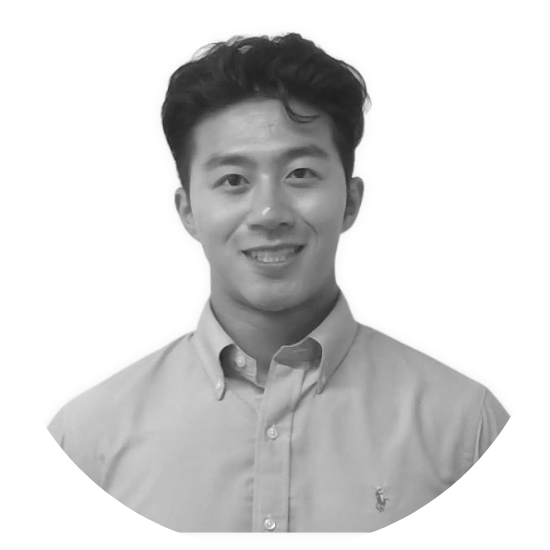
Max Wang
Max is a rising senior studying Bioengineering at the University of Pennsylvania. His research interests include systems immunology—particularly engineering comprehensive therapeutic strategies for autoimmune disorders—and the development of microphysiological systems to better model and analyze immune interactions. In the future, Max hopes to pursue research in academia and make impactful discoveries while supporting the next generation of scientists and engineers. Outside the lab, Max enjoys running, backpacking, and baking, and sharing his passion for learning as a volunteer tutor.
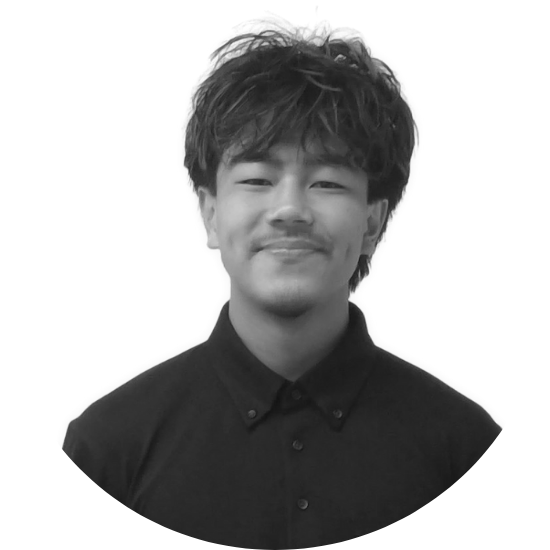
Shota Maekawa
Shota Maekawa is an undergraduate student at the University of California, Irvine, pursuing a bachelors in Biomedical Engineering. Shota is also an undergraduate researcher at the Digman Lab, studying the mechanisms of chemoresistance in cancer cells using microscopy and fluorescence dynamics. Shota has joined the Biomedical Internship program, here at Terasaki Institute to pursue his interests in Precision Medicine and Medical Device development.
CONTACT US
For more information about our research, to discuss potential collaborations, or to inquire about joining our team, please reach out to us at zhaohui.wang@terasaki.org.
RESEARCH PAPERS
1. Xiang K, Wang E, Mantyh J, Rupprecht G, Negrete M, Sanati G, Hsu C, Randon P, Dohlman A, Kretzschmar K WANG Z, Wang X, Clevers H, Hsu D, Shen X. Chromatin Remodeling in Patient‐Derived Colorectal Cancer Models. Advanced Science. 2024;11(16):2303379.
2. Kawakita S, Shen A, Chao C-C, WANG Z, Cheng S, Li B, Jiang C. An integrated database of experimentally validated major histocompatibility complex epitopes for antigen-specific cancer therapy. Antibody Therapeutics. 2024:tbae011.
3. Han Y, Shen A, WANG Z, Garrett A, Jiang C. Distinct signatures of tumor-associated macrophage subpopulations predict survival in renal cell carcinoma. Cancer Research. 2024;84(6_Supplement):3457-.
4. WANG Z, Boretto M, Millen R, Natesh N, Reckzeh ES, Hsu C, Negrete M, Yao H, Quayle W, Heaton BE. Rapid tissue prototyping with micro-organospheres. Stem Cell Reports 2022. p. 1959-75.
5. Hsu C, WANG Z, Oh S, Rupprecht G, Pittman K, Smith A, Delubac D, Shen X, Jia J, Hsu SD. Microorganospheres as a novel precision oncology platform in colorectal cancer. American Society of Clinical Oncology; 2022.
6. Ding S, Hsu C, WANG Z, Natesh NR, Millen R, Negrete M, Giroux N, Rivera GO, Dohlman A, Bose S. Patient-derived micro-organospheres enable clinical precision oncology. Cell Stem Cell. 2022;29(6):905-17. e6.
7. WANG Z, Xu C, Diplas BH, Moure CJ, Chen C-PJ, Chen LH, Du C, Zhu H, Greer PK, Zhang L. Targeting mutant PPM1D sensitizes diffuse intrinsic pontine glioma cells to the PARP inhibitor olaparib. Molecular Cancer Research. 2020;18(7):968-80.
8. Moure CJ, Diplas BH, Chen LH, Yang R, Pirozzi CJ, WANG Z, Spasojevic I, Waitkus MS, He Y, Yan H. CRISPR editing of mutant IDH1 R132H induces a CpG methylation-low state in patient-derived glioma models of G-CIMP. Molecular Cancer Research. 2019;17(10):2042-50.
9. Waitkus MS, Pirozzi CJ, Moure CJ, Diplas BH, Hansen LJ, Carpenter AB, Yang R, WANG Z, Ingram BO, Karoly ED. Adaptive evolution of the GDH2 allosteric domain promotes gliomagenesis by resolving IDH1R132H-induced metabolic liabilities. Cancer Research. 2018;78(1):36-50.
10. Diplas BH, Waitkus MS, He X, Brosnan-Cashman J, Liu H, Chen L, WANG Z, Moure C, Killela P, Lipp ES. GENE-01. THE GENOMIC LANDSCAPE OF TRIPLE-NEGATIVE GLIOBLASTOMA. Neuro-Oncology. 2018;20(suppl_6):vi102-vi3.
11. Diplas BH, He X, Brosnan-Cashman JA, Liu H, Chen LH, WANG Z, Moure CJ, Killela PJ, Loriaux DB, Lipp ES. The genomic landscape of TERT promoter wildtype-IDH wildtype glioblastoma. Nature Communications. 2018;9(1):2087.
12. Diplas B, Waitkus M, He X, Brosnan-Cashman J, Liu H, Chen L, WANG Z, Moure C, Killela P, Lipp E. GENE-42. THE GENOMIC LANDSCAPE OF TRIPLE-NEGATIVE GLIOBLASTOMA. Neuro-Oncology. 2018;20(suppl_6):vi112-vi.
13. Xu C, Liu X, Geng Y, Bai Q, Pan C, Sun Y, Chen X, Yu H, Wu Y, Zhang P, WANG Z, Yang R, Lewis J, Bigner D, Zhao F, He Y, Yan H, Shen Q, Zhang L. Patient-derived DIPG cells preserve stem-like characteristics and generate orthotopic tumors. Oncotarget. 2017;8(44):76644.
14. Chen X, Zhu Y, WANG Z, Zhu H, Pan Q, Su S, Dong Y, Li L, Zhang H, Wu L. mTORC1 alters the expression of glycolytic genes by regulating KPNA2 abundances. Journal of Proteomics. 2016;136:13-24.
15. Huang D-S, WANG Z, He X-J, Diplas BH, Yang R, Killela PJ, Meng Q, Ye Z-Y, Wang W, Jiang X-T. Recurrent TERT promoter mutations identified in a large-scale study of multiple tumour types are associated with increased TERT expression and telomerase activation. European Journal of Cancer. 2015;51(8):969-76.
16. Zhang L, Chen LH, Wan H, Yang R, WANG Z, Feng J, Yang S, Jones S, Wang S, Zhou W. Exome sequencing identifies somatic gain-of-function PPM1D mutations in brainstem gliomas. Nature Genetics. 2014;46(7):726-30.
17. Killela PJ, Pirozzi CJ, Healy P, Reitman ZJ, Lipp E, Rasheed BA, Yang R, Diplas BH, WANG Z, Greer PK. Mutations in IDH1, IDH2, and in the TERT promoter define clinically distinct subgroups of adult malignant gliomas. Oncotarget. 2014;5(6):1515.
18. WANG Z, Zhang J, Wang Y, Xing R, Yi C, Zhu H, Chen X, Guo J, Guo W, Li W. Matrine, a novel autophagy inhibitor, blocks trafficking and the proteolytic activation of lysosomal proteases. Carcinogenesis. 2013;34(1):128-38.
19. Xing R, Li W, Cui J, Zhang J, Kang B, Wang Y, WANG Z, Liu S, Lu Y. Gastrokine 1 induces senescence through p16/Rb pathway activation in gastric cancer cells. Gut. 2012;61(1):43-52.
20. Wang Y, Wei H, Pan Q, WANG Z, Xing R, Li W, Zhang J, Ding M, Guo J, Wu L. Identification and elimination of heterophilic antibody interference during antibody pair screening. Analytical Biochemistry. 2012;430(1):1-3.
PATENTS
1. WANG Z, Shen X. Methods and apparatuses for purification of gel droplets supporting biological tissue. US Patent App. 18/126,393; 2023.
2. Shen X, Hsu D, Motschman J, Delubac D, WANG Z. Methods and apparatuses for patient-derived micro-organospheres. US Patent 11,555,180; 2023.
3. Shen X, Delubac D, Hsu D, Motschman J, WANG Z. Precision drug screening for personalized cancer therapy. US Patent App. 17/178,210; 2021.
4. WANG Z, Shen X. Methods and apparatuses for testing hepatocyte toxicity using microorganospheres. Application PCT/US2023/066409, 2023
5. Shen X, WANG Z, Quayle, W, Jenkinson G. Imaging-based microorganosphere drug assays. Application US18/235, 2023









